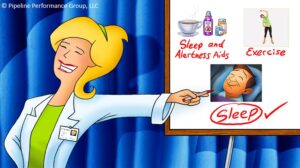When you prepare to drive on a long road trip, most of us fill our vehicle’s tank to “full” before embarking on the journey. This ensures our ability to travel a great distance before the interruption of refueling. In a similar way, it helps us to go the distance when we fuel our bodies according to the needs ahead of us. Food can provide quick energy for our brain and muscles, as well as sustained energy that keeps us feeling full over a longer period.
Our need for proper fueling includes three macronutrients: protein, carbohydrates (carbs) and fats. Generally, about 40% of our diet should come from protein, approximately 40% from carbohydrates, and the remaining 20% from healthy fats. The ratio may vary slightly depending on gender, age, and activity level. When we eat proteins, carbs and fats, we ingest micronutrients which include vitamins and minerals.
Protein is the primary structural component of our cells. It helps build and repair muscle tissue. Protein takes longer to break down in the digestive tract, so it keeps us feeling full longer than carbohydrates do. Protein is an important nutrient for sustained energy. Both plant and animal sources can provide us with the quality protein we need for healthy bones, hair, skin and other tissues. Adults should aim to consume between 70 – 100 grams of protein daily.
Carbs provide us with quick energy for brain function and movement. Good sources for carbs are fruits, veggies, and whole grains. They are the body’s primary source of energy and the brain’s preferred energy source. Carbs are broken down into glucose which is then used by our cells, tissues and organs as fuel. If we do not consume enough carbohydrates in our diet, our body will break down muscle tissue and convert it to glucose. This process is not readily available for nourishment of the brain, so eating the right quantity and quality of carbs is important for brain function.
Eating quality protein and carbohydrates is important for maintaining and building muscle tissue, especially as we age. Sarcopenia, muscle loss, begins to affect us after middle age unless we actively fight against it with proper diet and exercise. It is reversible and even avoidable.
And then, there’s fat. Yes, it is very important that we consume enough healthy fat in our diet. Animal protein, nuts and seeds, avocados, and olive oil are good sources of fat. Dietary fats are essential as an energy source and like protein, they keep us feeling full longer. They also protect the health of each cell wall, keeping them pliable for taking in nutrients and giving off waste. They insulate and protect organs. Fats help us absorb nutrients and play a key role in producing hormones.
Consume fuel according to the activity that will follow. Ask yourself, “How active will I be for the next few hours”? If you have some heavy lifting to do, you will want to consume plenty of protein along with carbs and fat to boost and maintain energy for the duration of your activity. If you will be seated at a desk for several hours, you may need smaller quantities of protein, carbs, and fat to fuel your body.
Consider your body’s need and fuel accordingly.
MANAGING FATIGUE EDUCATIONAL PROGRAM
Scarlet Knight © 2023 Please Distribute to Others.




